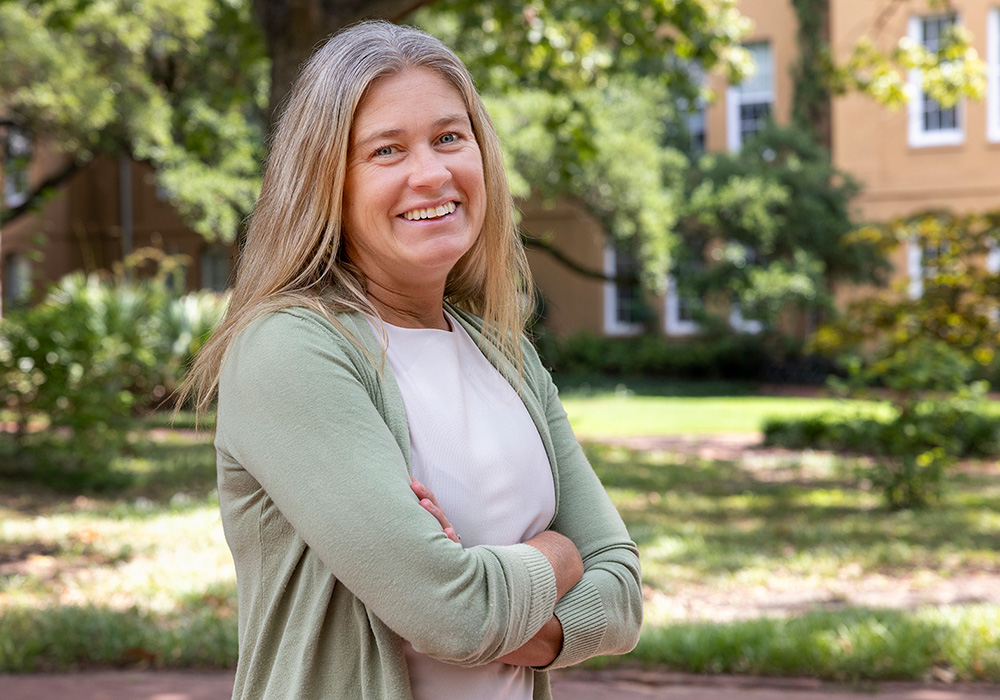Traveling to Bangladesh as a high-schooler captivated young Emily Manetta. Hearing the many languages spoken around her and the daily calls to prayer truly fed her passion to know more.
“I first went to Bangladesh for the summer with a family friend when I was 16 years old,” the recently arrived University of South Carolina professor and linguistics program director says. “That began my lifelong interest in South Asia.”
That fascination sparked what would become a comprehensive, scholarly exploration of linguistics and Islamic studies as an undergraduate at Swarthmore College and, ultimately, a doctorate in linguistics from the University California at Santa Cruz. At the University of South Carolina, Manetta is working on Indic languages and theoretical syntax, among other areas, as well as serving on a committee formed by the Office of the Vice President for Research aimed at encouraging faculty to use artificial intelligence in their research.
Between the lines
A broadly diverse global field, linguistics is known to most non-scholars simply as the study of language. The bulk of Manetta’s work focuses on the syntax of South Asian languages. She investigates phenomena such as how questions are formed.
Interestingly, linguists focus not only on what is said aloud, but what is not said. Manetta also studies ellipsis, which is when a speaker omits some content that has already been spoken in the conversation. An example in English: “Joanna baked a perfect chocolate soufflé, but Jane didn’t.” There seems to be an obvious economy in not repeating that Jane didn’t also “bake a perfect chocolate soufflé.” The phenomenon is found in languages spoken all over the world, and Manetta’s research has compared its use in several languages.
“In many parts of the world, speaking multiple languages is just a normal part of your day."
In her latest work, Manetta plans to investigate understudied varieties of the Romani language, which is spoken by an estimated 3 million people worldwide and can be traced to India more than 1,000 years ago.
After 17 years on the faculty at the University of Vermont, Manetta and husband Jonah Steinberg, a USC associate professor of anthropology, were thrilled to make the move to USC in January. The couple has three children, ages 8, 12 and 15. They already have developed a strong affection for the Palmetto State.
“We are loving South Carolina so far. We have met great people in Columbia,” she says. “Everyone has been incredibly welcoming.”
Since arriving in Columbia, Manetta and Steinberg partnered as co-investigators, winning a three-year National Science Foundation Dynamic Language Infrastructure-Documenting Endangered Languages grant for $450,000.
“We will collaborate with a linguist from a major institute in Paris to study little-known and imperiled varieties of the Romani language,” Steinberg says. “The grant affords some interesting opportunities for unusual interventions, like pop-up exhibitions and community interactive listening rooms. Romani is an Indian language spoken across Europe by that continent’s largest minority.”
More than words
Being a linguist with three children has benefits for both Manetta and her children, she says. She’s gained a firsthand view into language acquisition, and her children have gained from their exposure to other languages and cultures.
“We have always brought the kids with us to the fields, usually out of necessity,” she says. “They come to understand that not everyone in the world lives the way they do or speaks the way they do.”
Manetta also continues work she began in Vermont as she maintains her affiliation with UVM’s Vermont Conversation Lab. She collaborates with a research team exploring the language of serious illness conversations. She recently published a paper with her student, Ian Bhatia, on the use of the word “just” in bereavement narratives of those who lost loved ones during the COVID-19 pandemic.
“We have always brought the kids with us to the field. They come to understand that not everyone in the world lives the way they do or speaks the way they do.”
“We noticed a special way of using the word ‘just’ in these narratives,” Manetta explains. “We have lots of words that do different jobs in conversation. We found this ‘just’ often arises in contexts in which the speaker intends to describe an extreme or profound experience. They are in a heightened emotional state,” perhaps at a temporary loss for the right words.
The researchers are now turning to another kind of profound conversation. Manetta is part of a team investigating communication between participants and therapists in Psychedelic-Assisted Therapy clinical trials.
Manetta loves traveling to South Asia when she can, especially northern India and Pakistan, near the Himalayas.
“People in South Asia often love to talk about language,” she says. “Most people in India and Pakistan are multilingual by necessity. In many parts of the world, speaking multiple languages is just a normal part of your day.”
